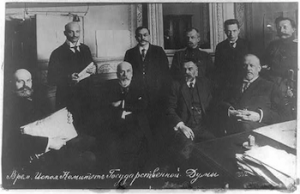After almost two hundred years of expanding a nation that would be respected as an equal to the Western European states, the Russian Empire fell. The 1917 Revolution in March called for the abdication of the Tsar, Nicholas II, as well as the need for a government of the people to take its place. When Nicholas abdicated though, he appointed his brother, the Grand Duke Mikhail Alexandrovich, as his heir; he was the next to rule what was left of this grand Empire. But the citizens weren’t calling for a different monarch, but a new form of government altogether. Mikhail seemed to sense this, since in his response to his new title, he declared that he would rule until the “will of the nation regarding the form of government to be adopted.” (( http://community.dur.ac.uk/a.k.harrington/abdicatn.html )) He wanted for the people to choose what they wanted out of a government and was willing to take charge just until that moment.
The First Provisional Government based itself on the principles that one sees in a democratic government’s ideals, such as freedom of free speech, press and assembly, anti-discrimination, universal suffrage, and elections for positions of governments. (( http://community.dur.ac.uk/a.k.harrington/provgov1.html )) But there are some surprising conditions that appear too in their Statute. They promise immediate amnesty to acts such as terrorism and revolts and protection for those in the military that took part in the revolution. While these may seem surprising at first, they make sense in terms of the goals of the new provisional government. These ten men were presumably at the heart of the revolution, or at least in favor of what the revolutionaries were doing, or else they would not have gotten such high positions in the cabinet, so it makes sense that they would pardon men who were arrested by the old government if they were on the same side. Both the fall of the centuries-long monarchy and the beginning of a new government were new experiences for the Russian people that changed their lives for better or worse.

